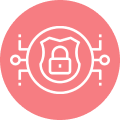Fake Bank Phone Call
(Vishing)
Scammers often pretend to be bank employees and inform victims over the phone about urgent issues regarding their bank accounts. The victims are coerced into providing their bank account details and personal identification, while in reality, the scammers aim to steal this information.
Example of the Scam:
A scammer calls the victim, claiming that their bank account has been locked for security reasons and requests the necessary information for immediate unlocking.
How to Avoid It:
Always be cautious and never share personal or financial information over the phone. If you have doubts about the caller's identity, ask questions, and if necessary, call back using the official customer service number of the bank.




















